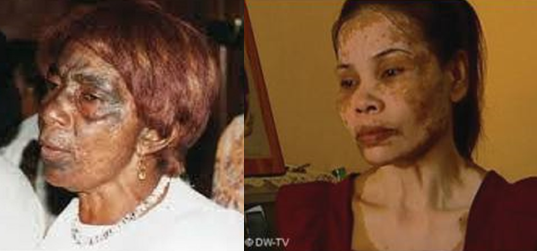In every society where you find people with a natural dark skin colour skin lightening products — also known as skin brightening, skin whitening, or skin bleaching agents — are used by some. The reasons people lighten their skin colour are many. In some societies, like Argentina, Brazil and India, a citizen with a lighter colour has far better socio-economic prospects than one with a darker colour. This is called colourism and refers to the belief that lighter skin is better and more beautiful than darker skin. In these societies, racism is also an issue and citizens get more rights and opportunities the lighter their skin colour.
In African countries with a population that is predominantly of a darker skin, skin lightening is more to do with the perceived beauty of a light skin compared to a dark skin. A large section of Africans has been brainwashed into thinking and believing that the lighter skin is superior to the darker skin. In African countries, it is the female of the species that usually lighten their skins. Some brainwashed African men are also part of the problem as they prefer women with a lighter skin tone, thereby perpetuating the problem. In countries like the Democratic Republic of Congo, even men do skin lightening.
In Zambia, it is common to see women who have used skin lightening creams. Some have turned from a lovely dark skin to a so-so light skin. Some of these people are known as FBI, or formerly black individuals. Some of these individuals have developed severe skin damage and their skin has different hues!
Skin lightening creams and other bleaching products contain ingredients that work to decrease the body’s production of melanin. Melanin is a pigment produced by skin cells called melanocytes and determines how light or dark the skin appears.
CONTENTS OF SKIN LIGHTENING PRODUCTS
Many skin lightening products — especially those sold without prescription — have been found to have dangerous side effects.
Skin lightening products come in the form of creams, lotions, oils, and serums. These products are also available in injectable forms. Most skin lightening creams contain hydroquinone, corticosteroids, and mercury. Hydroquinone is known to decrease melanocytes. Vitamin C, also a common ingredient in skin lightening creams, is an antioxidant that is known to lower melanin production in cells. Glycolic acid, which is also found in many skin lightening creams, works as an exfoliant and helps to lighten the skin colour by clearing away dead cells.
MEDICAL USES
Pharmaceutically approved skin lightening creams have a limited medical role when used under supervision.
COSMETIC USES
Many people have sought these products to help reduce discoloured spots, uneven skin tones, acne scars, as well as to make freckles less noticeable. Some of these conditions are due to aging, sun damage, or a skin reaction to trauma. Hormonal imbalances and some hormonal diseases can also lead to darkening of the skin.
Treatment is best done under the supervision of a health care worker so that dangerous products are avoided.
GENERAL RISKS
Many over-the-counter and natural skin lightening products have not been proven safe or effective. Some of the components of these products have known health risks. Many don’t provide long-lasting results. Users may notice that their skin returns to its original colour after the bleaching effect wears off.
DOCUMENTED ADVERSE EFFECTS
Skin lightening creams cause skin inflammation and skin irritation. Because many of the products contain steroids, steroid acne is also a possible side effect. Skin lightening creams can lead to skin breakdown and leave users with open sores and scarring. The redness and lesions can lead to pain that is difficult to manage.
The ingredient hydroquinone has been linked to a disorder that makes the skin appear black and blue. This condition is difficult to treat and can result in permanent discoloration of the skin.
SERIOUS ADVERSE EFFECTS
Concerns have been raised over recent years about the mercury content in skin lightening creams. Mercury is a heavy metal that is toxic even in small amounts. Mercury exposure over time can cause symptoms like numbness, tingling, dizziness, forgetfulness, headaches, and depression. More severe symptoms include confusion, muscle weakness, trouble breathing, changes in vision and difficulty in walking. Mercury poisoning requires immediate medical attention. Exposure to mercury can also cause kidney damage over time. Users of skin lightening products have been diagnosed with a serious kidney disease called nephrotic syndrome. Nephrotic syndrome is a kidney disorder that causes the body to excrete too much protein in the urine. Symptoms of nephrotic syndrome include severe swelling and fluid retention, foamy urine, fatigue, and loss of appetite. nephrotic syndrome is difficult to treat.
Injectable products are banned in many countries because they are not proven to work and carry dangerous side effects. Many of the products contain ingredients like glutathione, collagen, and human placenta. KEEP AWAY!
Pharmaceutically approved skin lightening creams can be an option to help with unwanted skin darkening or spots. Those who want to use these products should talk to a health care provider, especially a dermatologist.
CONSULT A DERMATOLOGIST AND AVOID RESORTING TO OVER-THE-COUNTER PRODUCTS!

